Ford Puma VS BYD Sealion 7 – Specs, Efficiency & Price Comparison
Which model is the better choice – the Ford Puma or the BYD Sealion 7? We compare performance (168 HP vs 530 HP), boot capacity (523 L vs 520 L), efficiency (13.10 kWh5.40 L vs 19.90 kWh), and of course, the price (24800 £ vs 41100 £).
Find out now which car fits your needs better!
The Ford Puma (SUV) is powered by a Petrol MHEV or Electric engine and comes with a Manuel or Automatic transmission. In comparison, the BYD Sealion 7 (SUV) features a Electric engine and a Automatic gearbox.
When it comes to boot capacity, the Ford Puma offers 523 L, while the BYD Sealion 7 provides 520 L – depending on what matters most to you. If you’re looking for more power, you’ll need to decide whether the 168 HP of the Ford Puma or the 530 HP of the BYD Sealion 7 suits your needs better.
There are also differences in efficiency: 13.10 kWh5.40 L vs 19.90 kWh. In terms of price, the Ford Puma starts at 24800 £, while the BYD Sealion 7 is available from 41100 £.
Compare all the key specs now and find out which model fits your lifestyle best!
Ford Puma
The Ford Puma presents itself as a stylish compact SUV with a distinctive design that combines practicality with a dynamic driving experience. Its sleek lines and sporty aesthetics make it stand out on the road, while the interior offers a comfortable and tech-savvy environment. With an emphasis on efficiency and a smooth drive, the Ford Puma is well-suited for both urban commutes and countryside adventures.
details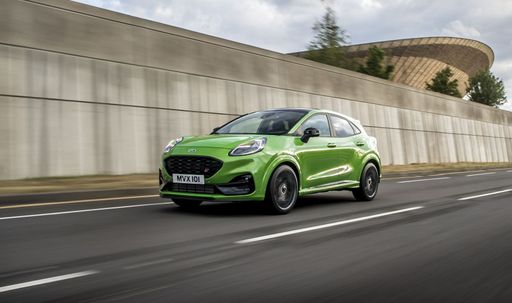 @ puma.fordpresskits.com
@ puma.fordpresskits.com
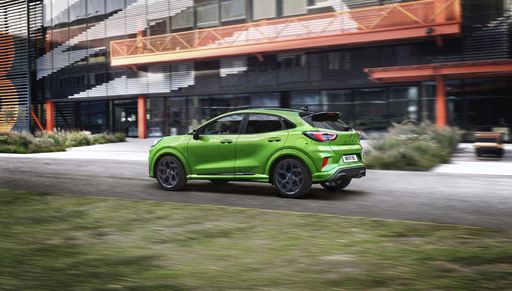 @ puma.fordpresskits.com
@ puma.fordpresskits.com
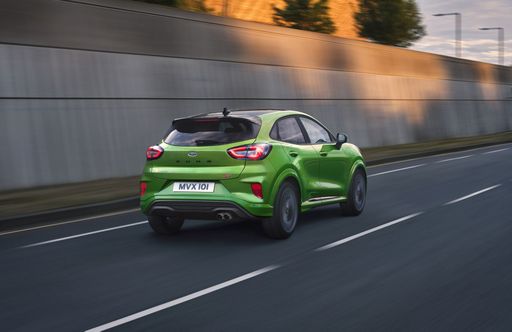 @ puma.fordpresskits.com
@ puma.fordpresskits.com
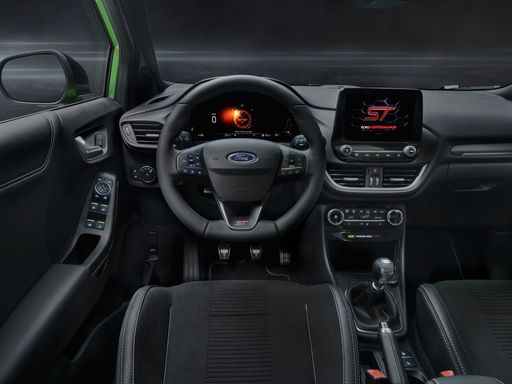 @ puma.fordpresskits.com
@ puma.fordpresskits.com
BYD Sealion 7
The Sealion 7 captivates with its striking design and impressive performance that appeals to both enthusiasts and casual drivers alike. With a focus on comfort and advanced technology, this model redefines the driving experience, making every journey enjoyable. Its sleek silhouette coupled with an innovative interior showcases the perfect blend of style and functionality.
details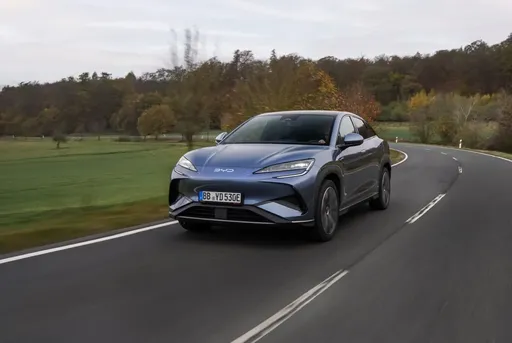 @ BYD
@ BYD
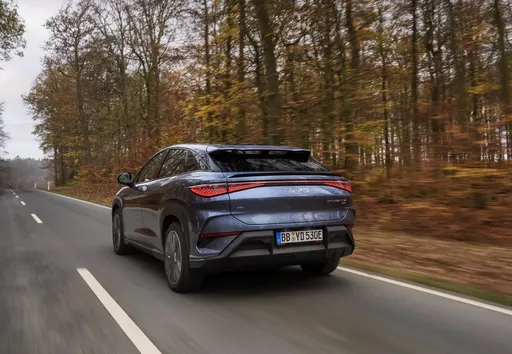 @ BYD
@ BYD
 @ BYD
@ BYD

|

|
|
|
|
Costs and Consumption |
|
|---|---|
|
Price
24800 - 36300 £
|
Price
41100 - 50600 £
|
|
Consumption L/100km
5.4 - 6 L
|
Consumption L/100km
-
|
|
Consumption kWh/100km
13.1 - 13.7 kWh
|
Consumption kWh/100km
19.9 - 21.9 kWh
|
|
Electric Range
364 - 376 km
|
Electric Range
456 - 502 km
|
|
Battery Capacity
43 kWh
|
Battery Capacity
-
|
|
co2
0 - 136 g/km
|
co2
0 g/km
|
|
Fuel tank capacity
42 L
|
Fuel tank capacity
-
|
Dimensions and Body |
|
|---|---|
|
Body Type
SUV
|
Body Type
SUV
|
|
Seats
5
|
Seats
5
|
|
Doors
5
|
Doors
4
|
|
Curb weight
1316 - 1563 kg
|
Curb weight
2225 - 2435 kg
|
|
Trunk capacity
456 - 523 L
|
Trunk capacity
520 L
|
|
Length
4186 - 4226 mm
|
Length
4830 mm
|
|
Width
1805 mm
|
Width
1925 mm
|
|
Height
1550 - 1555 mm
|
Height
1620 mm
|
|
Payload
367 - 469 kg
|
Payload
410 kg
|
Engine and Performance |
|
|---|---|
|
Engine Type
Petrol MHEV, Electric
|
Engine Type
Electric
|
|
Transmission
Manuel, Automatic
|
Transmission
Automatic
|
|
Transmission Detail
Schaltgetriebe, Automat. Schaltgetriebe (Doppelkupplung)
|
Transmission Detail
-
|
|
Drive Type
Front-Wheel Drive
|
Drive Type
Rear-Wheel Drive, All-Wheel Drive
|
|
Power HP
125 - 168 HP
|
Power HP
313 - 530 HP
|
|
Acceleration 0-100km/h
7.4 - 9.8 s
|
Acceleration 0-100km/h
4.5 - 6.7 s
|
|
Max Speed
160 - 210 km/h
|
Max Speed
215 km/h
|
|
Torque
170 - 290 Nm
|
Torque
380 - 690 Nm
|
|
Number of Cylinders
3
|
Number of Cylinders
-
|
|
Power kW
92 - 124 kW
|
Power kW
230 - 390 kW
|
|
Engine capacity
999 cm3
|
Engine capacity
-
|
General |
|
|---|---|
|
Model Year
2024 - 2025
|
Model Year
2024
|
|
CO2 Efficiency Class
D, E, A
|
CO2 Efficiency Class
A
|
|
Brand
Ford
|
Brand
BYD
|
Ford Puma
A Glimpse into the Ford Puma: Fusing Style with Innovation
The Ford Puma stands as a testament to modern engineering fused with style. This compact SUV is not just about aesthetics but brings to the table an array of technical innovations, topped with the reliability and performance Ford is known for. Let's delve into the technical specifics and innovative features that make the Ford Puma a stellar choice for any car enthusiast.
Powertrains and Performance
The Ford Puma is offered with a range of powertrains designed to deliver optimal performance whilst minimising fuel consumption. At the heart of this compact SUV is the 1.0 EcoBoost Hybrid engine, available in both 125 PS and 155 PS variants. This engine is a marvel of engineering, optimised to deliver power efficiently with a remarkable fuel consumption ranging from 5.4 to 5.7 L/100km for manual versions, and slightly higher for the automated variants.
The top-end 1.5 EcoBoost ST variant takes performance up a notch, providing a robust 200 PS that propels the Puma from 0 to 100 km/h in just 6.7 seconds. This variant is perfect for those who prioritise performance and exhilaration in their driving experience.
Mild-Hybrid Technology
The Puma's mild-hybrid technology plays a significant role in enhancing fuel efficiency and reducing emissions. By utilising a belt-driven integrated starter/generator, the Puma recovers energy usually lost during braking, storing it in a 48-volt lithium-ion battery. This stored energy is then used to assist the engine, providing a boost during acceleration and smoothing out the stop-start technology, ultimately leading to enhanced fuel efficiency.
Design and Comfort
The Ford Puma does not compromise on style and comfort with its ergonomic and stylish design. The SUV is available in multiple trims including the ST-Line, Titanium, and the luxurious Vignale editions, each offering unique aesthetic and technological enhancements. These trim levels provide varied offerings in terms of both exterior styling and interior comfort, ensuring there's a Puma that meets every personal preference.
Inside, the Puma offers a driver-focused cockpit with advanced technological integrations such as the SYNC 3 infotainment system, providing seamless connectivity and intuitive control of the vehicle's numerous technological features.
Safety and Technology
Safety remains paramount, and the Ford Puma is equipped with the latest security and technology features. It boasts the Ford Co-Pilot360 suite which includes adaptive cruise control, pre-collision assist with autonomous emergency braking, and lane-keeping assist, enabling a safer driving experience on both city roads and highways.
Versatility and Practicality
Beyond performance and safety, the Ford Puma shines in its versatility. With a boot capacity of 456 litres, it offers ample space for all sorts of adventures, whether you're heading on a family trip or loading sports equipment. Its innovative MegaBox is an extra storage solution, providing additional space below the boot floor.
The Puma's agile handling, paired with its compact dimensions—spanning a length of 4186 to 4266 mm and a width of 1805 mm—makes it an ideal choice for urban commuting and beyond.
Conclusion
In conclusion, the Ford Puma beautifully blends practical features with cutting-edge technology, offering a package that appeals to both the tech-savvy driver and those seeking comfort and reliability. Its range of innovative features, powerful yet efficient engine options, and a design that is both functional and stylish make it a frontrunner in the compact SUV market.
Whether you're drawn by the efficient mild-hybrid engines or the robust performance of the ST variant, the Ford Puma represents a modern driving experience where innovation meets everyday usability.
BYD Sealion 7
The automotive landscape is evolving faster than ever, and one model capturing significant attention is the BYD Sealion 7. This electric SUV not only marries performance with sustainability but also boasts innovations that redefine user expectations. Let’s dive into the technical aspects and standout innovations of this remarkable vehicle.
Powerful Performance and Versatile Configurations
The BYD Sealion 7 comes in several configurations, catering to diverse performance needs. It offers two versions of electric all-wheel drive, producing an impressive 530 horsepower, while the rear-wheel drive variant delivers a solid 313 horsepower. This spectrum of power allows drivers to select an option that aligns with their driving style and requirements.
Acceleration is another noteworthy aspect of the Sealion 7. The rear-wheel drive model achieves 0-100 km/h in just 6.7 seconds, while the all-wheel drive variant does it in a breathtaking 4.5 seconds. This combination ensures that the Sealion 7 doesn’t just compete; it leads in performance within its segment.
Innovative Electric Drive and Efficiency
Equipped with a cutting-edge reduction gearbox, the BYD Sealion 7 not only delivers incredible acceleration but also underscores efficiency with a consumption rate as low as 19.9 kWh per 100 km for the most efficient model. The all-wheel drive variants have slightly higher consumption rates of 21.4 kWh and 21.9 kWh, respectively, but they still perform admirably when it comes to efficiency.
In terms of electric range, the Sealion 7 showcases a commendable performance. Depending on the specific configuration, it offers ranges between 456 and 502 km on a single charge, making it a competitive choice for those concerned about range anxiety typical of electric vehicles.
Sleek Design and Practicality
Beyond performance and efficiency, the BYD Sealion 7 impresses with its aesthetic appeal and practicality. With dimensions of 4830 mm in length, 1925 mm in width, and 1620 mm in height, this SUV is designed for presence. Moreover, the spacious interior comfortably accommodates up to five passengers, enhancing its usability for families and adventure seekers alike.
Practical features like a trunk capacity of 520 liters ensure that the Sealion 7 stands ready for any journey, whether it’s a weekend road trip or daily commuting. Additionally, the vehicle has a payload capacity of up to 410 kg, providing flexibility for carrying cargo without sacrificing comfort.
Safety and Eco-Friendliness
The BYD Sealion 7 also excels in safety and sustainability. It holds a CO2 efficiency class of A, making it an environmentally friendly option with zero emissions during operation. This aligns with the growing consumer demand for greener transportation solutions.
Furthermore, the vehicle is engineered with multiple safety features that ensure a secure driving experience for all occupants, a crucial element that underscores the ongoing commitment by BYD to safety in electric vehicles.
Final Thoughts
As an emblem of electrification in the automotive industry, the BYD Sealion 7 stands out with its combination of powerful performance, innovative technology, and eco-friendly credentials. For those exploring the electric SUV market, this vehicle represents a significant milestone, offering a compelling argument for drivers looking to transition to a more sustainable yet thrilling driving experience.
The prices and data displayed are estimates based on German list prices and may vary by country. This information is not legally binding.
